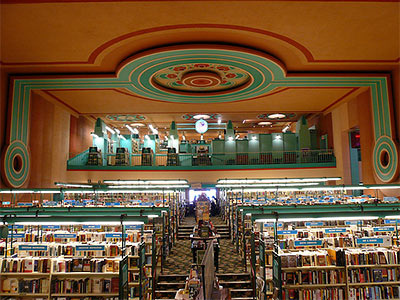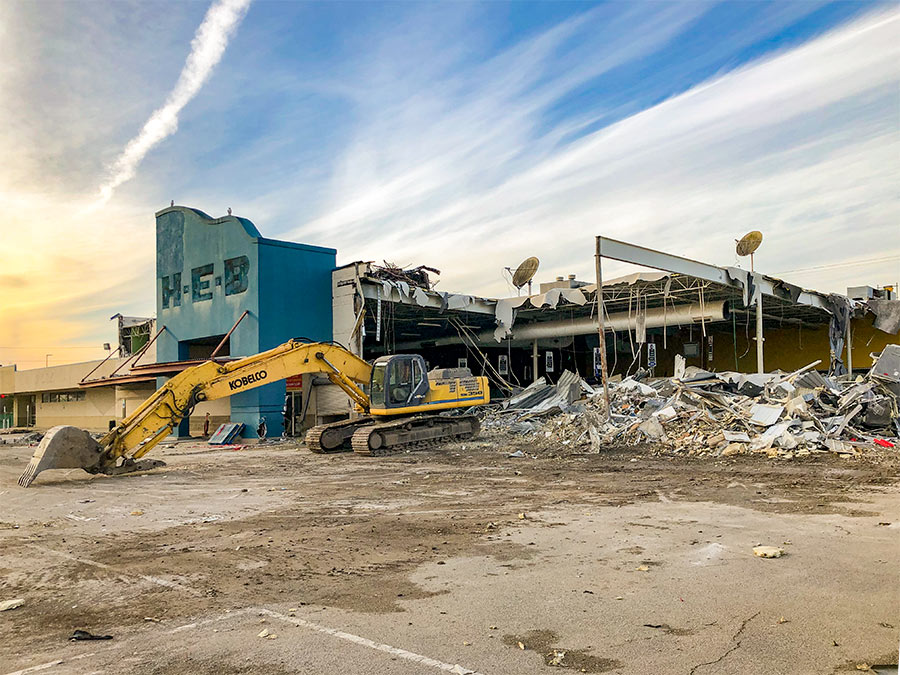
 Isn’t Weingarten Realty going to preserve some of the interior of its landmarked Alabama Theater as it makes the space ready for Trader Joe’s — or if that deal somehow falls through, some other tenant? Sure: The lobby and theater ceilings are being left alone, and a decorative plaster “medallion” on the north wall is supposed to remain in place — though it’ll be stripped of some outer layers. An upper section of the balcony will also stay, along with some light fixtures in the lobby. But other than those items, the entire 1939 theater space — or rather, what’s left of it after Weingarten encased the auditorium’s preserved sloped floor in concrete last year — is being gutted, according to plans drawn up for the project by Heights Venture Architects. A permit for the conversion of the historic Art Deco building to a retail “shell” was granted by the city earlier this week.
Isn’t Weingarten Realty going to preserve some of the interior of its landmarked Alabama Theater as it makes the space ready for Trader Joe’s — or if that deal somehow falls through, some other tenant? Sure: The lobby and theater ceilings are being left alone, and a decorative plaster “medallion” on the north wall is supposed to remain in place — though it’ll be stripped of some outer layers. An upper section of the balcony will also stay, along with some light fixtures in the lobby. But other than those items, the entire 1939 theater space — or rather, what’s left of it after Weingarten encased the auditorium’s preserved sloped floor in concrete last year — is being gutted, according to plans drawn up for the project by Heights Venture Architects. A permit for the conversion of the historic Art Deco building to a retail “shell” was granted by the city earlier this week.
***

Included in the demolition: The entire front portion of the theater balcony, portions of the former auditorium’s south wall (enlarging the openings into what was originally a hallway along its side), portions of the mezzanine floor, and the storefront windows facing Shepherd — as well as all other remnants of the building’s theatrical past that had been carefully preserved in the early 1980s when the structure was converted for use as a bookstore. The large original murals that flanked what used to be the theater’s stage aren’t referenced in the latest demo or renovation plans; they were demolished when the concrete floor was poured last October.
Plans for the demolition of the theater interior similar to the current ones were drawn up and sent out to bid 2 years ago, in anticipation of the property at 2922 S. Shepherd being converted into a Staples. But after Swamplot published news of those plans, Weingarten issued a carefully worded denial distancing itself from any interior demo work. Last year, Weingarten received city approval for alterations to the building’s exterior in order to accommodate a Trader Joe’s in the space. But Trader Joe’s has yet to announce a store in that location, and no lease has been announced either. Alterations to the interior of the theater are not subject to approval by the city’s historical commission; only the building’s exterior has been designated historic.
Heights Venture’s demolition and construction plans cover the conversion of the once-grand theater space into a “cold dark shell” for future tenant improvements, and don’t mention Trader Joe’s. However, they do call for the construction of a new “corral” for shopping carts outside the west entrance. And electrical plans connected to the project — but likely to be permitted separately — do list Trader Joe’s as the client.
- Alabama Theater coverage [Swamplot]
Photos: Laurie Ballesteros (stage [license]), Jim Parsons/Preservation Houston (former Bookstop exterior), Flickr user mlsnp (balcony view)





Ugh. Weingarten Realty deserves a Bad Brick Award for their continued assault on vintage architecture.
If people are so concerned with preserving the theater then they should have never stopped attending the theater in the first place.
What do people expect to happen to a place when they stop going?
Really larrydierker? The Alabama stopped being a theater before I was born. I remember it as the coolest chain bookstore I had ever been to, and B&N pulled out because costs were higher at that location, not because people weren’t shopping there.
At least Weingutten is leaving the shell….this time.
Yeah, I never stopped going to the Alabama Theater either. It couldn’t compete with the suburban theaters in the age of VCR’s and multiplexes, but a lot of people loved it. And after it closed down, there was basically no place to see first-run movies inside the loop for several years.
Heights Venture strikes again. No surprise really; see an awful, derivative, schlockified strip center – it’s likely a HV gem.
An old theater that can not show movies is basically good for nothing. All you preservationist should be doing cartwheels that they tried to save anything at all. As anything other than a theater it is basically a lawyers wet dream – All these people who want to save buildings in prime real estate areas because they are old even though they have clearly lived out there useful and practical life amaze me. You wont shop there b/c its inconvenient compared to the new store that is full of new things and all of todays modern luxuries – but by god if someone wants to tear it down, or even modify it so that it is not just a legal liability to the owners – We will protest and complain! All you people are also the most likely be the first to sue when you got hurt there too…
How exactly do art deco frescoes and murals create a premises liability issue? I’m just a lawyer, so clearly I don’t understand the issue.
@heyzeus: it is well known in the insurance industry that Art Deco design is one of the most hazardous design movements in American history. The prominence of frescos and ceiling designs causes customers to look up at the walls and ceilings instead of paying attention to where they are walking. The result is that customers frequently trip and fall on objects that would usually be avoided but for the presence of Art Deco design. The most famous case is Steve Grabowski v. Jules Leleu. Mr. Grabowski had a trip and fall after he turned his gaze towards a magnificently designed Jules Leleu desk at an insurance agency in Chicago, Illinois. Mr. Grabowski was able to recover under the theory of “excessive design”. The lawsuit spawned a flood of design related personal injury litigation. Since that landmark case in 1957, architects and design professionals have been turning out drab and dull utilitarian buildings for fear of litigation breeding Art Deco design.
So, the destruction of the River Oak’s Shopping Center and the Alabama theater are subsequent remedial measures? If so, then I don’t think we are allowed to talk about it.
Old School gets my vote for comment of the day.
Marvelously played, Old School. Golf clap.
Sounds like Nashville, Tennessee. Their Historical purists will demand you maintain a building “they” deem of historical significance in proper “Period” condition with proper doors and type of glass in the windows even if it’s a private home and not on the historical tour roster. Older buildings that were built before A/C are hot and uncomfortable by today’s standards unless they have proper attic fan circulation to keep conditions adequate.